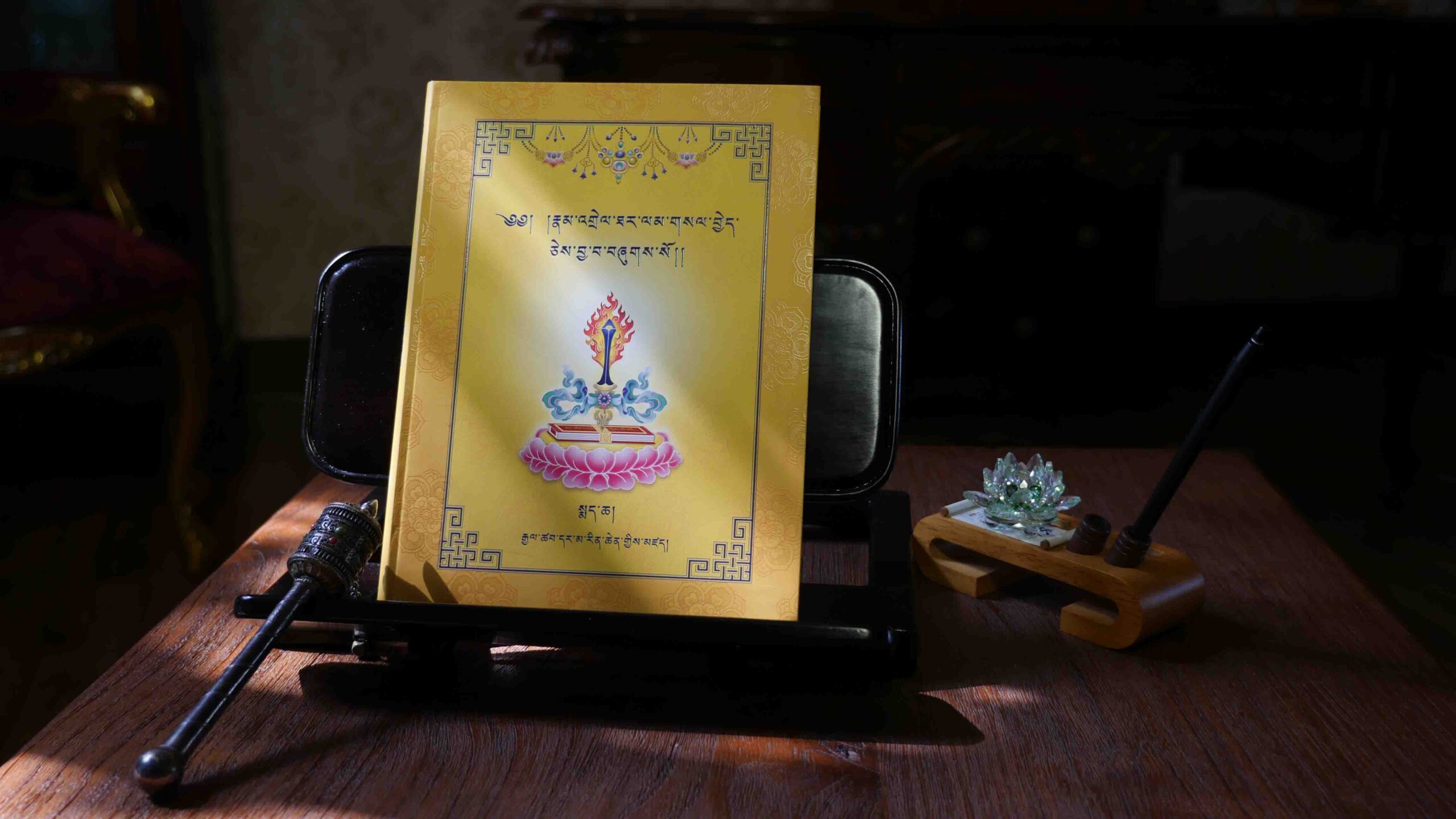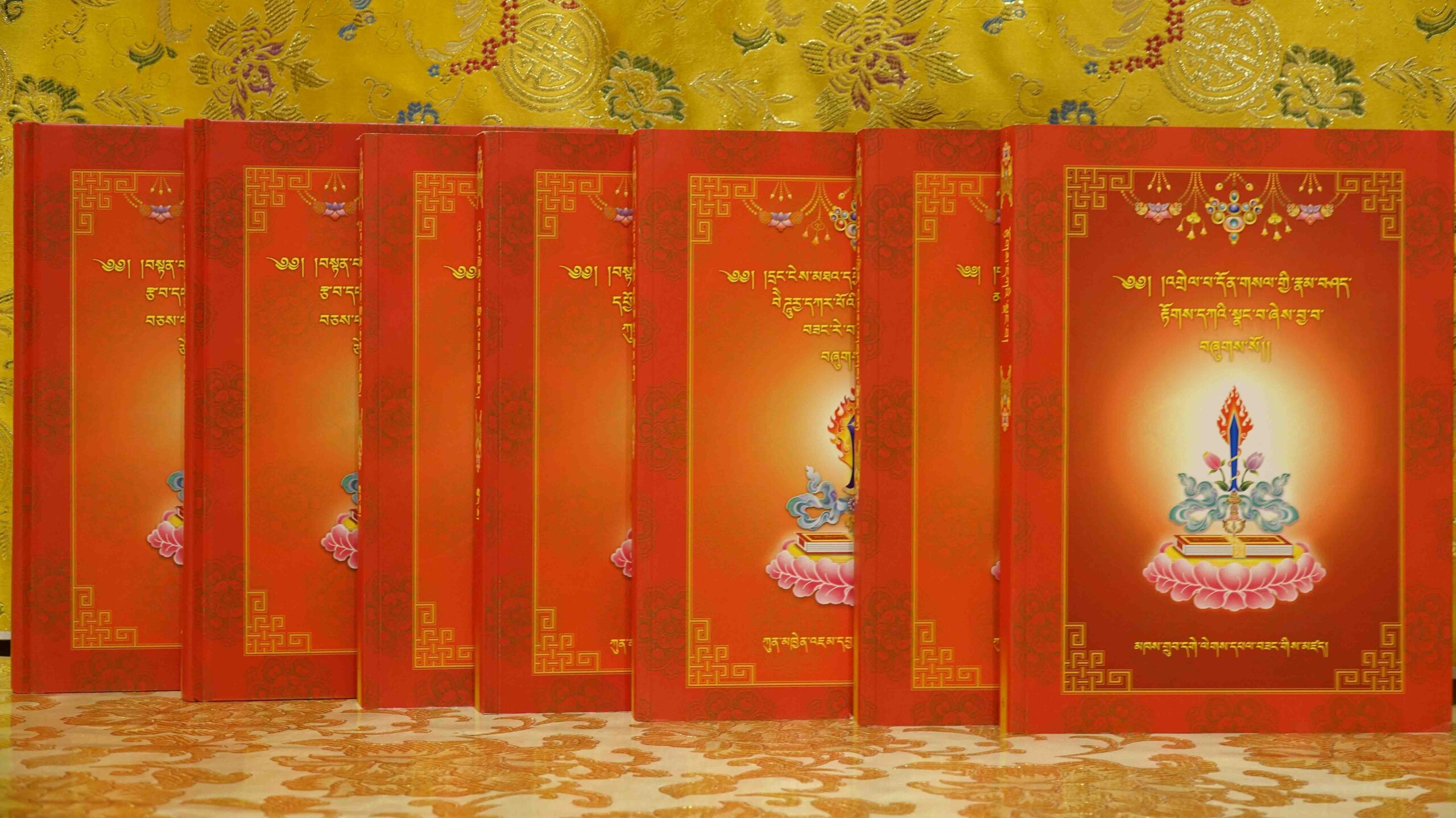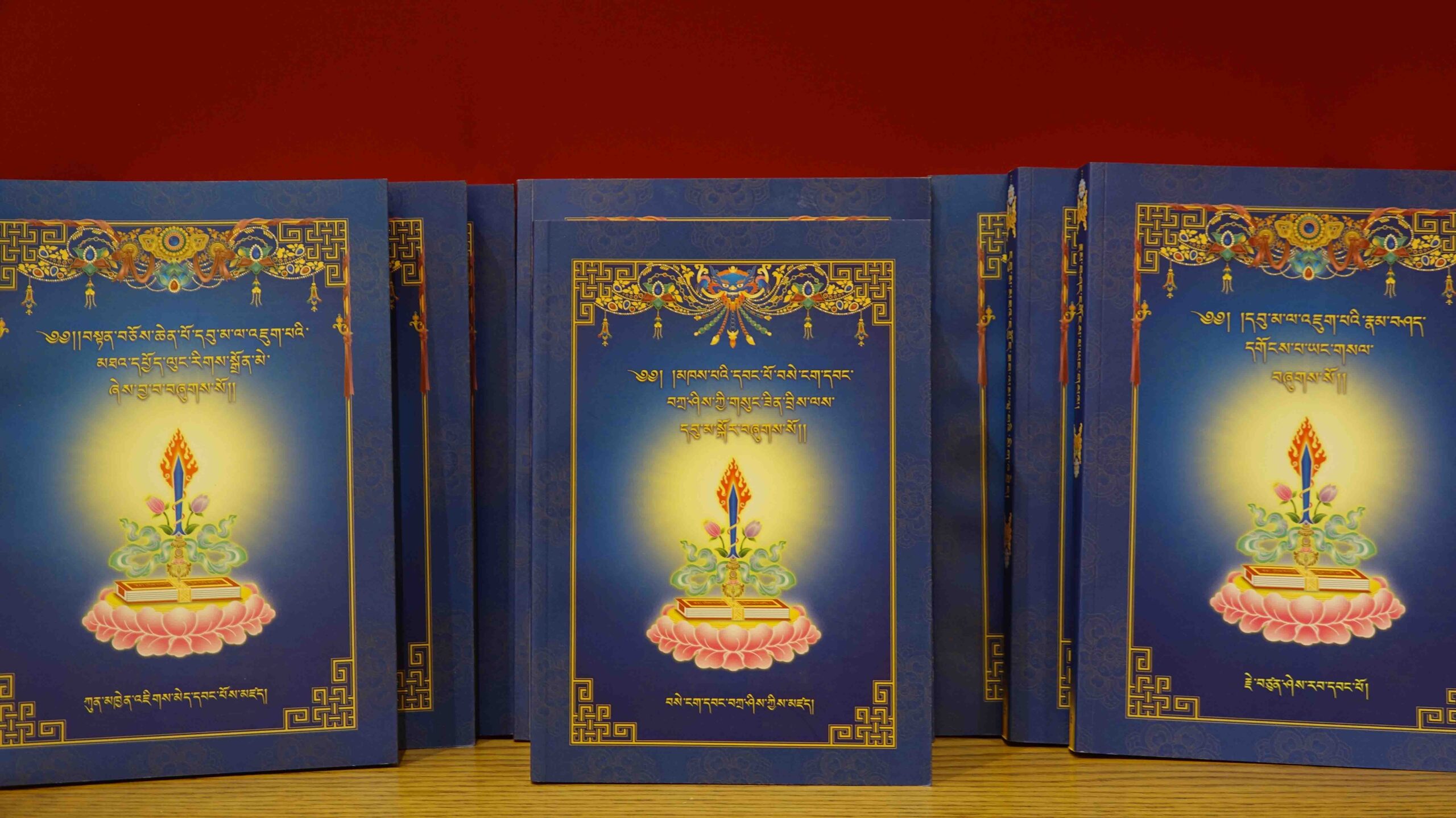Intermediate Program
Overview
The Ornament of Clear Knowledge is composed by Maitreya. It is the core text among the “Five Great Treatises” curriculum. Through learning this text, students gain an understanding of the Buddha, Bodhisattva, Śrāvaka and Pratyekabuddha, particularly their different levels of wisdom, approaches to helping others, and how the outcomes vary in terms of breadth and depth. Students will also gain an understanding of the content, method and stages of learning, hence develop a comprehensive view of Buddhist practice and a motivation to learn.
Requirements
Required: 165 credits
Electives: 28 credits
| "Five Great Treatises" | Foundations of Buddhist Practice | Buddhist Monasticism & Ministry | Language Studies for Sutra Translation | ||||||||||
|---|---|---|---|---|---|---|---|---|---|---|---|---|---|
|
Required: 125 credits Ornament of Clear Knowledge (41 credits) Debate (36 credits) Sutra Recitation (48 credits) |
Required: 28 credits Stages of the Path to Enlightenment (4credits) Precepts (24 credits) |
Required: 12 credits Morning and Evening Prayers (12 credits) |
Electives: 4 credits Chinese Language (2 credits) Tibetan Language (2 credits) |
||||||||||
|
Electives: 12 credits Supplementary materials from Ornament of Clear Knowledge |
Electives: 8 credits Commentaries on Stages of the Path to Enlightenment (4 credits) Buddhist Teachings (2 credits) Buddhist Sutra Recitation (2 credits) |
Electives: 4 credits Ceremonial Prayers (2 credits) Practical Buddhism (2 credits) |
|||||||||||
| Course Title | Credit(s) |
|---|---|
| FGT1301. A Commentary on the Seventy Topics; A Garland of Philosophies | 3 |
| FGT1302. Debate on A Commentary on the Seventy Topics; A Garland of Philosophies | 3 |
| FGT1303. Recitation on Ornament of Clear Knowledge I | 4 |
| FBP1109. The Great Treatise IX | 2 |
| FBP1209. Bodhisattva Precepts III | 2 |
| BMM1109. Morning & Evening Prayer – Intermediate I | 1 |
| FGT1304. Ornament of Clear Knowledge I | 4 |
| FGT1305. Debate on Explanation and Analysis of Ornament of Clear Knowledge I; Annotations on Chapter One of Ornament of Clear Knowledge I | 3 |
| FGT1306. Recitation on Ornament of Clear Knowledge II | 4 |
| FBP1110. The Great Treatise X | 2 |
| FBP1210. Bodhisattva Precepts IV | 2 |
| BMM1110. Morning & Evening Prayer – Intermediate II | 2 |
| Course Title | Credit(s) |
|---|---|
| FGT1307. Ornament of Clear Knowledge II | 4 |
| FGT1308. Debate on Explanation and Analysis of Ornament of Clear Knowledge II; Annotations on Chapter One of Ornament of Clear Knowledge II | 3 |
| FGT1309. Recitation on Ornament of Clear Knowledge III | 4 |
| FBP1211. Nanshan Precepts: Beilan I | 2 |
| BMM1111. Morning & Evening Prayer – Intermediate III | 1 |
| FGT1310. Ornament of Clear Knowledge III | 4 |
| FGT1311. Debate on Explanation and Analysis of Ornament of Clear Knowledge II; Annotations on Chapter One of Ornament of Clear Knowledge II; The Twenty Practitioners | 3 |
| FGT1312. Recitation on Ornament of Clear Knowledge IV | 4 |
| FBP1212. Nanshan Precepts: Beilan II | 2 |
| BMM1112. Morning & Evening Prayer – Intermediate IV | 1 |
| Course Title | Credit(s) |
|---|---|
| FGT1313. Ornament of Clear Knowledge IV | 4 |
| FGT1314. Debate on Explanation and Analysis of Ornament of Clear Knowledge Ⅳ; Annotations on Chapter One of Ornament of Clear Knowledge Ⅳ | 3 |
| FGT1315. Recitation on Ornament of Clear Knowledge V | 4 |
| FBP1213. Nanshan Precepts: Beilan Ⅲ | 2 |
| BMM1113. Morning & Evening Prayer – Intermediate Ⅴ | 1 |
| FGT1316. Twelve Dependent Arisings | 3 |
| FGT1317. Debate on A Detailed Explanation of the Twelve Dependent Arisings | 3 |
| FGT1318. Recitation on Ornament of Clear Knowledge VI | 4 |
| FBP1214. Nanshan Precepts: Beilan Ⅳ | 2 |
| BMM1114. Morning & Evening Prayer – Intermediate Ⅵ | 1 |
| Course Title | Credit(s) |
|---|---|
| FGT1319. Ornament of Clear Knowledge V | 4 |
| FGT1320. Debate on Explanation and Analysis of Ornament of Clear Knowledge Ⅴ; Annotations on Chapter One of Ornament of Clear Knowledge Ⅴ | 3 |
| FGT1321. Recitation on Ornament of Clear Knowledge VII | 4 |
| FBP1215. Nanshan Precepts: Beilan Ⅴ | 2 |
| BMM1115. Morning & Evening Prayer – Intermediate Ⅶ | 1 |
| FGT1322. Fundamental Consciousness | 3 |
| FGT1323. Debate on Key Difficult Points Regarding the Fundamental Consciousness | 3 |
| FGT1324. Recitation on Ornament of Clear Knowledge VIII | 4 |
| FBP1216. Nanshan Precepts: Beilan VI | 2 |
| BMM1116. Morning & Evening Prayer – Intermediate VIII | 1 |
| Course Title | Credit(s) |
|---|---|
| FGT1325. Ornament of Clear Knowledge VI | 3 |
| FGT1326. Debate on Explanation and Analysis of Ornament of Clear Knowledge VI | 3 |
| FGT1327. Recitation on Ornament of Clear Knowledge IX | 4 |
| FBP1217. Nanshan Precepts: Beilan VII | 2 |
| BMM1117. Morning & Evening Prayer – Intermediate IX | 1 |
| FGT1328. Essence of True Eloquence | 3 |
| FGT1329. Debate on Essence of Eloquence: Differentiating Interpretable and Definitive Meanings | 3 |
| FGT1330. Recitation on Ornament of Clear Knowledge X | 4 |
| FBP1218. Nanshan Precepts: Beilan VIII | 2 |
| BMM1118. Morning & Evening Prayer – Intermediate X | 1 |
| Course Title | Credit(s) |
|---|---|
| FGT1331. Ornament of Clear Knowledge VII | 3 |
| FGT1332. Debate on Explanation and Analysis of Ornament of Clear Knowledge VII | 3 |
| FGT1333. Recitation on Ornament of Clear Knowledge XI | 4 |
| FBP1219. Precepts for Fully-Ordained Buddhist Nuns I | 2 |
| BMM1119. Morning & Evening Prayer – Intermediate XI | 1 |
| FGT1334. Form and Non-Form | 3 |
| FGT1335. Debate on “Form and Non-Form” | 3 |
| FGT1336. Recitation on Ornament of Clear Knowledge XII | 4 |
| FBP1220. Precepts for Fully-Ordained Buddhist Nuns II | 2 |
| BMM1120. Morning & Evening Prayer – Intermediate XII | 1 |

Year 1
The Detailed Commentary upon Valid Perception was composed by Dharmakīrti. Dharmakīrti was a profound Buddhist philosopher who worked at Nālandā, one of the greatest Buddhist monastic universities in history. It is the first course in the “Five Great Treatises” curriculum.
The Detailed Commentary upon Valid Perception expounds various forms of logic, and trains students to think outside the norm, sharpen their thinking skills, and reduce ambiguity. Due to its high level of difficulty, it is divided into three sections, namely “Collected Topics”, “Buddhist Logic”, and "Science of Mind". This allows students to take a step-by-step approach in familiarizing the concepts and processes behind logical reasoning.
As students develop this method of analysis and apply it to their practice throughout the curriculum, not only can they better understand Buddhist philosophies, they are capable of working through problems with sound reasoning.
| Course Title | Credit(s) |
|---|---|
| FGT1101. Se’s Collected Topics—Basic Reasoning Skills I | 3 |
| FGT1102. Debate on Se’s Collected Topics—Basic Reasoning Skills I | 3 |
| FGT1103. Recitation on Se’s Collected Topics – Basic Reasoning Skills I | 4 |
| FBP1101. The Great Treatise I | 2 |
| FBP1201. The Ten Precepts for Novice Nuns I | 2 |
| BMM1101. Morning & Evening Prayer—Introductory I | 1 |
| BMM1201. Daily Curriculum I | 1 |
| LST1101. Tibetan Language—Basic Oral Conversation I | 2 |
| FGT1104. Se’s Collected Topics—Basic Reasoning Skills II | 3 |
| FGT1105. Debate on Se’s Collected Topics—Basic Reasoning Skills II | 3 |
| FGT1106. Recitation on Se’s Collected Topics—Basic Reasoning Skills II | 4 |
| FBP1102. The Great Treatise II | 2 |
| FBP1202. The Ten Precepts for Novice Nuns II | 2 |
| BMM1102. Morning & Evening Prayer—Introductory II | 1 |
| BMM1202. Daily Curriculum II | 1 |
| LST1102. Tibetan Language—Basic Oral Conversation II | 2 |

Year 2
This is the core text within “Five Great Treatises,” and accounts for the longest period of study at Great Wisdom. The author, Maitreya, a great Buddhist master, extensively illustrates the path to enlightenment. Within Buddhism, enlightenment is a state of complete wisdom combined with infinite compassion. Here, Maitreya provides a methodical roadmap to enlightenment: explaining each stage on the path, how to achieve it, and the obstacles along the way. In this series of courses, students explore their capacities for compassion and wisdom, and learn what it means to fully dedicate themselves to others. A number of supplementary materials gives students an in-depth understanding of this fundamental Buddhist scripture.
| Course Title | Credit(s) |
|---|---|
| FGT1101. Se’s Collected Topics—Basic Reasoning Skills I | 3 |
| FGT1102. Debate on Se’s Collected Topics—Basic Reasoning Skills I | 3 |
| FGT1103. Recitation on Se’s Collected Topics – Basic Reasoning Skills I | 4 |
| FBP1101. The Great Treatise I | 2 |
| FBP1201. The Ten Precepts for Novice Nuns I | 2 |
| BMM1101. Morning & Evening Prayer—Introductory I | 1 |
| BMM1201. Daily Curriculum I | 1 |
| LST1101. Tibetan Language—Basic Oral Conversation I | 2 |
| FGT1104. Se’s Collected Topics—Basic Reasoning Skills II | 3 |
| FGT1105. Debate on Se’s Collected Topics—Basic Reasoning Skills II | 3 |
| FGT1106. Recitation on Se’s Collected Topics—Basic Reasoning Skills II | 4 |
| FBP1102. The Great Treatise II | 2 |
| FBP1202. The Ten Precepts for Novice Nuns II | 2 |
| BMM1102. Morning & Evening Prayer—Introductory II | 1 |
| BMM1202. Daily Curriculum II | 1 |
| LST1102. Tibetan Language—Basic Oral Conversation II | 2 |

Year 3
How can we understand our minds to unlock the key in reaching our fullest potential? This final set of courses explores the realities of life, the evolution of the universe, and the moral disciplines within Buddhist philosophy. There are three courses within Advanced Studies: Entering the Middle Way, Treasury of Higher Knowledge, and Compendium of Discipline. Entering the Middle Way examines the Buddhist concept of emptiness; Treasury of Higher Knowledge provides a comprehensive explanation of the universe’s phenoma from the Buddhist perspective; Compendium of Discipline is an in-depth analysis of Buddhist monastic precepts.
| Course Title | Credit(s) |
|---|---|
| FGT1101. Se’s Collected Topics—Basic Reasoning Skills I | 3 |
| FGT1102. Debate on Se’s Collected Topics—Basic Reasoning Skills I | 3 |
| FGT1103. Recitation on Se’s Collected Topics – Basic Reasoning Skills I | 4 |
| FBP1101. The Great Treatise I | 2 |
| FBP1201. The Ten Precepts for Novice Nuns I | 2 |
| BMM1101. Morning & Evening Prayer—Introductory I | 1 |
| BMM1201. Daily Curriculum I | 1 |
| LST1101. Tibetan Language—Basic Oral Conversation I | 2 |
| FGT1104. Se’s Collected Topics—Basic Reasoning Skills II | 3 |
| FGT1105. Debate on Se’s Collected Topics—Basic Reasoning Skills II | 3 |
| FGT1106. Recitation on Se’s Collected Topics—Basic Reasoning Skills II | 4 |
| FBP1102. The Great Treatise II | 2 |
| FBP1202. The Ten Precepts for Novice Nuns II | 2 |
| BMM1102. Morning & Evening Prayer—Introductory II | 1 |
| BMM1202. Daily Curriculum II | 1 |
| LST1102. Tibetan Language—Basic Oral Conversation II | 2 |

Year 4
How can we understand our minds to unlock the key in reaching our fullest potential? This final set of courses explores the realities of life, the evolution of the universe, and the moral disciplines within Buddhist philosophy. There are three courses within Advanced Studies: Entering the Middle Way, Treasury of Higher Knowledge, and Compendium of Discipline. Entering the Middle Way examines the Buddhist concept of emptiness; Treasury of Higher Knowledge provides a comprehensive explanation of the universe’s phenoma from the Buddhist perspective; Compendium of Discipline is an in-depth analysis of Buddhist monastic precepts.
| Course Title | Credit(s) |
|---|---|
| FGT1101. Se’s Collected Topics—Basic Reasoning Skills I | 3 |
| FGT1102. Debate on Se’s Collected Topics—Basic Reasoning Skills I | 3 |
| FGT1103. Recitation on Se’s Collected Topics – Basic Reasoning Skills I | 4 |
| FBP1101. The Great Treatise I | 2 |
| FBP1201. The Ten Precepts for Novice Nuns I | 2 |
| BMM1101. Morning & Evening Prayer—Introductory I | 1 |
| BMM1201. Daily Curriculum I | 1 |
| LST1101. Tibetan Language—Basic Oral Conversation I | 2 |
| FGT1104. Se’s Collected Topics—Basic Reasoning Skills II | 3 |
| FGT1105. Debate on Se’s Collected Topics—Basic Reasoning Skills II | 3 |
| FGT1106. Recitation on Se’s Collected Topics—Basic Reasoning Skills II | 4 |
| FBP1102. The Great Treatise II | 2 |
| FBP1202. The Ten Precepts for Novice Nuns II | 2 |
| BMM1102. Morning & Evening Prayer—Introductory II | 1 |
| BMM1202. Daily Curriculum II | 1 |
| LST1102. Tibetan Language—Basic Oral Conversation II | 2 |
Buddhist debate and memorization.

Buddhist Debate
Debate is an intellectual tradition that traces back to the 5th century. Unique to Buddhist debate is its purpose. The goal is not to defeat the opponent. Rather, it is an exploration of truth. Buddha himself taught us to scrutinize his words and make our own conclusions. Debate serves this purpose. It is a powerful learning tool, strengthening analytical skills and sharpening the clarity of mind. It also trains us to recognize our own misconceptions and contradictions so we can effectively overcome our mental hurdles. Within the “Five Great Treatises” program, students practice debate throughout the introductory, intermediate, and advanced programs.

Memorization
Historically, memorization has been foundational in Buddhist education. It served as a form of learning, but was also critical in the oral tradition of passing down Buddhist texts. However, within our modern age, memorization is not obsolete. Science has shown that memorization is important for a multitude of cognitive functions, such as learning, focus, and, of course, memory. And within the process of learning, memorization is a critical first step━the more factual knowledge we have, the better we can think about it critically and analytically. Memorization is a core part of “Five Great Treatises” as students memorize throughout the 15-year years of study. Students memorize an average of 15,000-20,000 words each year.
